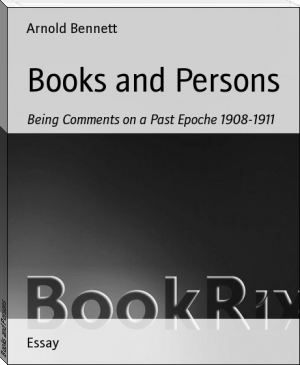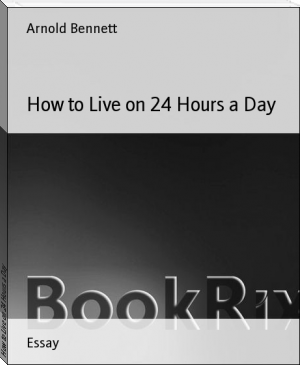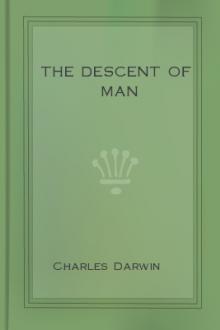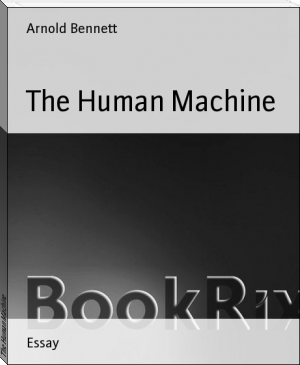Books and Persons - Arnold Bennett (phonics readers .TXT) 📗

- Author: Arnold Bennett
Book online «Books and Persons - Arnold Bennett (phonics readers .TXT) 📗». Author Arnold Bennett
* * * *
Of course the lecturer had to vulgarize his messages so as to get them safely into the brain of the audience. What an audience! For the first time in my life I saw the "library" public in the mass! It is a sight to make one think. My cab had gone up Bond Street, where the fortune-tellers flourish, and their flags wave in the wind, and their painted white hands point alluringly up mysterious staircases. These fortune-tellers make a tolerable deal of money, and the money they make must come out chiefly of the pockets of well-dressed library subscribers. Not a doubt but that many of Mr. Wells's audience were clients of the soothsayers. A strange multitude! It appeared to consist of a thousand women and Mr. Bernard Shaw. Women deemed to be elegant, women certainly deeming themselves to be elegant! I, being far from the rostrum, had a good view of the backs of their blouses, chemisettes, and bodices. What an assortment of pretentious and ill-made toilettes! What disclosures of clumsy hooks-and-eyes and general creased carelessness! It would not do for me to behold the "library" public in the mass too often!
* * * * *
I could not but think of the State performance of "Money" at Drury Lane on the previous night: that amusing smack at living artists. There has been a good deal of straight talk about it in the daily and weekly papers. But the psychology of the matter has not been satisfactorily explained. Blame has been laid at the King's door. I think wrongly, or at least unfairly. Besides being one of the two best shots in the United Kingdom, the King is beyond any question a man of honourable intentions and of a strict conscientiousness. But it is no part of his business to be sufficiently expert to choose a play for a State performance. He has never pretended to have artistic proclivities. Who among you, indeed, could be relied upon to choose properly a play for a State performance? Take the best modern plays. Who among you would dare to suggest for a State performance Oscar Wilde's "The Importance of Being Earnest," Bernard Shaw's "Man and Superman," John Galsworthy's "Justice," or Granville Barker's "The Voysey Inheritance"? Nobody! These plays are unthinkable for a State performance, because their distinction is utterly beyond the average comprehension of the ruling classes--and State performances are for the ruling classes. These plays are simply too good. Yet if you don't choose an old play you must choose one of these four plays, or make the worst of both worlds. Modern plays being ruled out, you must either have Shakespeare or--or what? What is there? "The Cenci"?
* * * * *
Can you not now sympathize with the King as he ran through, in his mind, the whole range of British drama? But the truth is that he did not run through the whole range of British drama. Invariably in these cases a list is submitted for the sovereign to choose from. It is an open secret that in this particular case such a list was prepared. Whether or not it was prepared by Mr. Arthur Collins, organizer of Drury Lane pantomimes, I cannot say. The list contained Shakespeare and Lytton, and I don't know who else. Conceivably the King did not want Shakespeare. To my mind he would be quite justified in not wanting Shakespeare. We are glutted with Shakespeare in the Haymarket. Well, then,--why not "Money"? It is a famous play. We all know its name and the name of its author. And that is the limit of our knowledge. Why should the King be supposed to be acquainted with its extreme badness? I confess I didn't know it was so bad as now it seems to be. And, not very long ago, was not Sir William Robertson Nicoll defending the genius of Lytton in the _British Weekly_? It is now richly apparent that "Money" ought not to have been included in the list submitted to the King. But it is easy to be wise after the event.
* * * * *
Let it be for ever understood that State theatres and State performances never have had, never will have, any real connexion with original dramatic art. That is one reason why I am against a national theatre, whose influence on the drama is bound to be sinister. To count the performance of "Money" as an insult to living artists is to lose sight of a main factor in the case. The State and living art must be mutually opposed, for the reason that the State must, and quite rightly does, represent the average of opinion. For an original artist to expect aid from the State is silly; it is also wrong. In expressing a particular regard for the feelings of musical comedy, and in announcing beforehand his intention of being present at the first night of the new Gaiety masterpiece, the King was properly fulfilling his duties as a monarch towards dramatic art. Art is not the whole of life, and to adore musical comedy is not a crime. The best thing original artists can do is to keep their perspective undistorted.
A PLAY OF TCHEHKOFF'S
[_8 June '11_]
At last, thanks to the Stage Society, we have had a good representative play of Anton Tchehkoff on the London stage. Needless to say, Tchehkoff was done in the provinces long ago. "The Cherry Orchard," I have been told, is Tchehkoff's dramatic masterpiece, and I can well believe it. But it is a dangerous thing to present foreign masterpieces to a West End audience, and the directors of the Stage Society discovered, or rediscovered, this fact on Sunday night last. The reception of "The Cherry Orchard" was something like what the reception of Ibsen's plays used to be twenty years ago. It was scarcely even a mixed reception. There could be no mistake about the failure of the play to please the vast majority of the members of the Society. At the end of the second act signs of disapproval were very manifest indeed, and the exodus from the theatre began. A competent authority informed me that at the end of the third act half the audience had departed; but in the narrative fever of the moment the competent authority may have slightly exaggerated. Certain it is that multitudes preferred Aldwych and the restaurant concerts, or even their own homes, to Tchehkoff's play. And as the evening was the Sabbath you may judge the extreme degree of their detestation of the play.
* * * * *
A director of the Stage Society said to me on the Monday: "If our people won't stand it, it has no chance, because we have the pick here." I didn't contradict him, but I by no means agreed that he had the pick there. The managing committee of the Society is a very enlightened body; but the mass of the members is just as stupid as any other mass. Its virtue is that it pays subscriptions, thus enabling the committee to make experiments and to place before the forty or fifty persons in London who really can judge a play the sort of play which is worthy of curiosity.
* * * * *
In spite of the antipathy which is aroused, "The Cherry Orchard" is quite inoffensive. For example, there is nothing in it to which the Censor could possibly object. It does not deal specially with sex. It presents an average picture of Russian society. But it presents the picture with such exact, uncompromising truthfulness that the members of the Stage Society mistook nearly all the portraits for caricatures, and tedious caricatures. In naturalism the play is assuredly an advance on any other play that I have seen or that has been seen in England. Its naturalism is positively daring. The author never hesitates to make his personages as ridiculous as in life they would be. In this he differs from every other playwright that I know of. Ibsen, for instance; and Henri Becque. He has carried an artistic convention much nearer to reality, and achieved another step in the evolution of the drama. The consequence is that he is accused of untruth and exaggeration, as Becque was, as Ibsen was. His truthfulness frightens, and causes resentment.
* * * * *
People say: "No such persons exist, or at any rate such persons are too exceptional to form proper material for a work of art." No such persons, I admit, exist in England; but then this play happens to be concerned with Russia, and even the men's costumes in it are appalling. Moreover, persons equally ridiculous and futile do exist in England, and by the hundred thousand; only they are ridiculous and futile in ways familiar to us. I guarantee that if any ten average members of the august Stage Society itself were faithfully portrayed on the stage, with all their mannerisms, absurdities, and futilities, the resulting picture would be damned as a gross and offensive caricature. People never look properly at people; people take people for granted; they remain blind to the facts; and when an artist comes along and discloses more of these facts than it is usual to disclose, of course there is a row. This row is a fine thing; it means that something has been done. And I hope that the directors of the Stage Society are proud of the reception of "The Cherry Orchard." They ought to be.
SEA AND SLAUGHTER
[_6 July '11_]
Recent spectacular events at Court have been the cause of a considerable amount of verse, indifferent or offensive. But it is to be noticed that the poets of this realm have not been inspired by the said events. I mean such writers as W.B. Yeats, Robert Bridges, Lord Alfred Douglas, W.H. Davies. And yet I see no reason why a Coronation, even in this day of figure-heads and revolting snobbery, should not be the subject of a good poem--a poem which would not be afflicting to read, either for the lettered public or for the chief actor in the scene. However, the time for such poems has apparently not yet arrived. And meanwhile the sea-and-slaughter school have been doing an excellent work these last few weeks in demonstrating how entirely absurd the sea-and-slaughter school is. Mr. Alfred Noyes has been very prominent, not only in his native page, _Blackwood's_, but also in the _Fortnightly Review_. Mr. Noyes is, I believe, the only
Of course the lecturer had to vulgarize his messages so as to get them safely into the brain of the audience. What an audience! For the first time in my life I saw the "library" public in the mass! It is a sight to make one think. My cab had gone up Bond Street, where the fortune-tellers flourish, and their flags wave in the wind, and their painted white hands point alluringly up mysterious staircases. These fortune-tellers make a tolerable deal of money, and the money they make must come out chiefly of the pockets of well-dressed library subscribers. Not a doubt but that many of Mr. Wells's audience were clients of the soothsayers. A strange multitude! It appeared to consist of a thousand women and Mr. Bernard Shaw. Women deemed to be elegant, women certainly deeming themselves to be elegant! I, being far from the rostrum, had a good view of the backs of their blouses, chemisettes, and bodices. What an assortment of pretentious and ill-made toilettes! What disclosures of clumsy hooks-and-eyes and general creased carelessness! It would not do for me to behold the "library" public in the mass too often!
* * * * *
I could not but think of the State performance of "Money" at Drury Lane on the previous night: that amusing smack at living artists. There has been a good deal of straight talk about it in the daily and weekly papers. But the psychology of the matter has not been satisfactorily explained. Blame has been laid at the King's door. I think wrongly, or at least unfairly. Besides being one of the two best shots in the United Kingdom, the King is beyond any question a man of honourable intentions and of a strict conscientiousness. But it is no part of his business to be sufficiently expert to choose a play for a State performance. He has never pretended to have artistic proclivities. Who among you, indeed, could be relied upon to choose properly a play for a State performance? Take the best modern plays. Who among you would dare to suggest for a State performance Oscar Wilde's "The Importance of Being Earnest," Bernard Shaw's "Man and Superman," John Galsworthy's "Justice," or Granville Barker's "The Voysey Inheritance"? Nobody! These plays are unthinkable for a State performance, because their distinction is utterly beyond the average comprehension of the ruling classes--and State performances are for the ruling classes. These plays are simply too good. Yet if you don't choose an old play you must choose one of these four plays, or make the worst of both worlds. Modern plays being ruled out, you must either have Shakespeare or--or what? What is there? "The Cenci"?
* * * * *
Can you not now sympathize with the King as he ran through, in his mind, the whole range of British drama? But the truth is that he did not run through the whole range of British drama. Invariably in these cases a list is submitted for the sovereign to choose from. It is an open secret that in this particular case such a list was prepared. Whether or not it was prepared by Mr. Arthur Collins, organizer of Drury Lane pantomimes, I cannot say. The list contained Shakespeare and Lytton, and I don't know who else. Conceivably the King did not want Shakespeare. To my mind he would be quite justified in not wanting Shakespeare. We are glutted with Shakespeare in the Haymarket. Well, then,--why not "Money"? It is a famous play. We all know its name and the name of its author. And that is the limit of our knowledge. Why should the King be supposed to be acquainted with its extreme badness? I confess I didn't know it was so bad as now it seems to be. And, not very long ago, was not Sir William Robertson Nicoll defending the genius of Lytton in the _British Weekly_? It is now richly apparent that "Money" ought not to have been included in the list submitted to the King. But it is easy to be wise after the event.
* * * * *
Let it be for ever understood that State theatres and State performances never have had, never will have, any real connexion with original dramatic art. That is one reason why I am against a national theatre, whose influence on the drama is bound to be sinister. To count the performance of "Money" as an insult to living artists is to lose sight of a main factor in the case. The State and living art must be mutually opposed, for the reason that the State must, and quite rightly does, represent the average of opinion. For an original artist to expect aid from the State is silly; it is also wrong. In expressing a particular regard for the feelings of musical comedy, and in announcing beforehand his intention of being present at the first night of the new Gaiety masterpiece, the King was properly fulfilling his duties as a monarch towards dramatic art. Art is not the whole of life, and to adore musical comedy is not a crime. The best thing original artists can do is to keep their perspective undistorted.
A PLAY OF TCHEHKOFF'S
[_8 June '11_]
At last, thanks to the Stage Society, we have had a good representative play of Anton Tchehkoff on the London stage. Needless to say, Tchehkoff was done in the provinces long ago. "The Cherry Orchard," I have been told, is Tchehkoff's dramatic masterpiece, and I can well believe it. But it is a dangerous thing to present foreign masterpieces to a West End audience, and the directors of the Stage Society discovered, or rediscovered, this fact on Sunday night last. The reception of "The Cherry Orchard" was something like what the reception of Ibsen's plays used to be twenty years ago. It was scarcely even a mixed reception. There could be no mistake about the failure of the play to please the vast majority of the members of the Society. At the end of the second act signs of disapproval were very manifest indeed, and the exodus from the theatre began. A competent authority informed me that at the end of the third act half the audience had departed; but in the narrative fever of the moment the competent authority may have slightly exaggerated. Certain it is that multitudes preferred Aldwych and the restaurant concerts, or even their own homes, to Tchehkoff's play. And as the evening was the Sabbath you may judge the extreme degree of their detestation of the play.
* * * * *
A director of the Stage Society said to me on the Monday: "If our people won't stand it, it has no chance, because we have the pick here." I didn't contradict him, but I by no means agreed that he had the pick there. The managing committee of the Society is a very enlightened body; but the mass of the members is just as stupid as any other mass. Its virtue is that it pays subscriptions, thus enabling the committee to make experiments and to place before the forty or fifty persons in London who really can judge a play the sort of play which is worthy of curiosity.
* * * * *
In spite of the antipathy which is aroused, "The Cherry Orchard" is quite inoffensive. For example, there is nothing in it to which the Censor could possibly object. It does not deal specially with sex. It presents an average picture of Russian society. But it presents the picture with such exact, uncompromising truthfulness that the members of the Stage Society mistook nearly all the portraits for caricatures, and tedious caricatures. In naturalism the play is assuredly an advance on any other play that I have seen or that has been seen in England. Its naturalism is positively daring. The author never hesitates to make his personages as ridiculous as in life they would be. In this he differs from every other playwright that I know of. Ibsen, for instance; and Henri Becque. He has carried an artistic convention much nearer to reality, and achieved another step in the evolution of the drama. The consequence is that he is accused of untruth and exaggeration, as Becque was, as Ibsen was. His truthfulness frightens, and causes resentment.
* * * * *
People say: "No such persons exist, or at any rate such persons are too exceptional to form proper material for a work of art." No such persons, I admit, exist in England; but then this play happens to be concerned with Russia, and even the men's costumes in it are appalling. Moreover, persons equally ridiculous and futile do exist in England, and by the hundred thousand; only they are ridiculous and futile in ways familiar to us. I guarantee that if any ten average members of the august Stage Society itself were faithfully portrayed on the stage, with all their mannerisms, absurdities, and futilities, the resulting picture would be damned as a gross and offensive caricature. People never look properly at people; people take people for granted; they remain blind to the facts; and when an artist comes along and discloses more of these facts than it is usual to disclose, of course there is a row. This row is a fine thing; it means that something has been done. And I hope that the directors of the Stage Society are proud of the reception of "The Cherry Orchard." They ought to be.
SEA AND SLAUGHTER
[_6 July '11_]
Recent spectacular events at Court have been the cause of a considerable amount of verse, indifferent or offensive. But it is to be noticed that the poets of this realm have not been inspired by the said events. I mean such writers as W.B. Yeats, Robert Bridges, Lord Alfred Douglas, W.H. Davies. And yet I see no reason why a Coronation, even in this day of figure-heads and revolting snobbery, should not be the subject of a good poem--a poem which would not be afflicting to read, either for the lettered public or for the chief actor in the scene. However, the time for such poems has apparently not yet arrived. And meanwhile the sea-and-slaughter school have been doing an excellent work these last few weeks in demonstrating how entirely absurd the sea-and-slaughter school is. Mr. Alfred Noyes has been very prominent, not only in his native page, _Blackwood's_, but also in the _Fortnightly Review_. Mr. Noyes is, I believe, the only
Free e-book «Books and Persons - Arnold Bennett (phonics readers .TXT) 📗» - read online now
Similar e-books:





Comments (0)